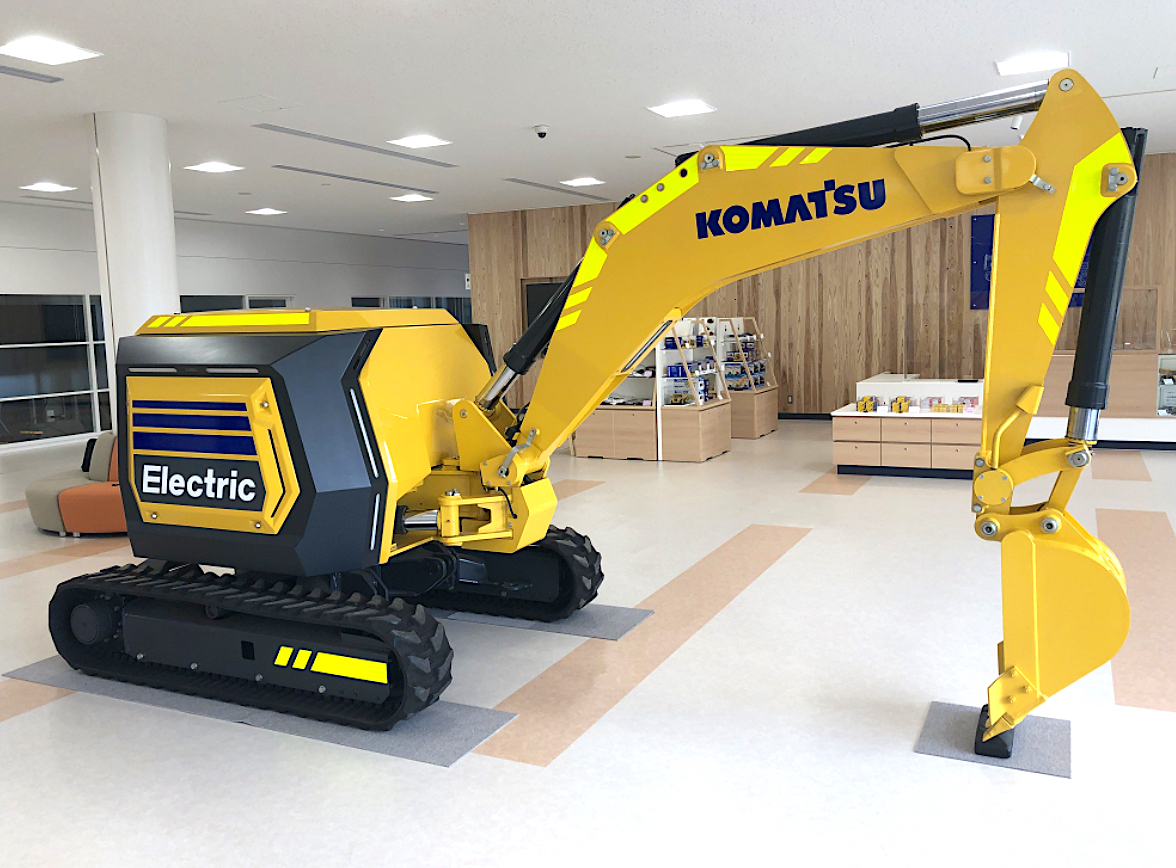How a rc excavator Helps You Tackle Challenging Terrain with Ease
Wiki Article
Understanding How Excavator Functions and Its Influence On Effectiveness
Excavators play a vital role in building and construction and mining procedures, counting on a complicated interplay of mechanical and hydraulic systems. Their capacity to do a range of tasks pivots on both their layout and the innovation integrated within. Understanding these elements can substantially affect operational performance and efficiency. As developments proceed to improve the industry, one have to think about just how these changes will certainly affect future techniques and efficiency.The Basics of Excavator Mechanics

The Function of Hydraulic Solutions in Excavators
At the heart of excavator procedure exists the hydraulic system, which plays a pivotal function in powering the machine's functions and motions. This system uses pressurized hydraulic liquid to move energy, allowing numerous actions such as swinging, digging, and lifting. By using the concepts of hydraulics, excavators can perform tasks with exceptional precision and force, boosting overall operational efficiency.The hydraulic system contains essential elements, consisting of cylinders, pumps, and valves, which collaborate to regulate the circulation and instructions of the liquid. When the operator engages the controls, the hydraulic liquid is guided to details cyndrical tubes, translating the driver's commands right into physical activity. This system permits responsive and smooth actions, which are vital in building and construction and excavation settings. double e volvo rc excavator. The performance of the hydraulic system directly impacts the performance and adaptability of the excavator, making it a crucial component in contemporary excavation processesSecret Elements of an Excavator
Understanding the vital parts of an excavator is necessary for grasping just how this powerful equipment runs. An excavator contains several substantial elements, consisting of the undercarriage, home, container, arm, and boom. The undercarriage provides stability and mobility, usually featuring tracks or wheels to browse various surfaces. Your home contains the engine and hydraulic systems, permitting the operator to regulate motion and power the machine. The boom prolongs from your house, allowing upright reach, while the arm connects to the container, facilitating excavating and lifting operations.Additionally, the taxicab houses the operator, furnished with controls for precise maneuvering. Each of these elements plays a vital function in the excavator's total functionality, adding to its performance and efficiency on building websites. Comprehending these parts aids in enhancing and keeping excavator performance, making sure tasks are completed securely and properly.Accessory Adaptability and Its Advantages
Attachment adaptability is an important facet of excavators, enabling operators to switch between different tools tailored for certain jobs. This flexibility not just boosts task efficiency however additionally contributes to cost-effectiveness by lowering the demand for multiple machines. Comprehending the various kinds of add-ons available can considerably affect the total efficiency and capability of an excavator on work websites.Sorts of Add-ons
While excavators are primarily recognized for their digging capacities, their real adaptability hinges on the vast array of attachments available. These add-ons boost the excavator's capability, allowing it to execute various tasks beyond excavation. Usual attachments consist of containers (for excavating and scooping), hydraulic thumbs (for realizing materials), and augers (for piercing holes) Grapples are made use of for relocating and taking care of debris, while rippers can separate hard surface areas. Other specialized attachments, such as plates and plows, make it possible for excavators to adjust to particular job needs. This diversity not just enhances the maker's utility across various markets, including construction, landscaping, and demolition, but additionally enables operators to tailor their devices to meet certain task demands efficiently.Raised Work Performance
Optimizing job performance is a primary benefit of utilizing numerous excavator attachments. Various attachments enable an excavator to do several jobs without needing to change devices, conserving valuable time and labor. Making use of a hydraulic hammer can damage concrete while a bucket accessory can dig deep into dirt, enabling a smooth operations. This adaptability lowers downtime related to devices modifications and boosts productivity on-site. Furthermore, specialized add-ons boost accuracy in tasks such as grading or landscaping, bring about better results. The capacity to adjust to different task needs not just simplifies procedures yet additionally minimizes the requirement for extra equipment, making certain that projects are completed promptly and successfully. On the whole, add-on versatility considerably adds to enhanced task effectiveness in excavation work.Cost-Effectiveness and Convenience
Cost-effectiveness is a significant benefit of using flexible excavator attachments. These accessories enable a single excavator to do numerous jobs, minimizing the demand for extra machinery and labor - double e volvo rc excavator. By changing between buckets, hammers, and grapples, drivers can take on numerous tasks, from excavating to demolition, therefore optimizing devices usage. This versatility not just reduces operational costs yet likewise minimizes downtime linked with changing equipment. In addition, the capacity to personalize excavators with specialized add-ons enhances performance, as they can successfully manage diverse jobs according to project needs. To wrap up, the mix of cost-effectiveness and adaptability in excavator accessories adds to boosted operational performance and source allotment in building and excavation projects
Advanced Innovation in Modern Excavators
Modern excavators are significantly equipped with advanced modern technology that transforms excavation procedures. Automation improves procedures, while improved fuel efficiency decreases functional expenses. In addition, smart control systems improve accuracy and safety, marking a significant development in excavation equipment.Automation in Excavation Processes
As excavation modern technology develops, automation has actually become a vital element in improving efficiency and accuracy on work sites. Modern excavators are furnished with sophisticated automated systems that promote tasks such as grading, digging, and trenching with minimal operator intervention. These systems make use of sensors, GPS, and artificial intelligence formulas to guarantee precise placing and depth control, greatly minimizing the margin for mistake. Furthermore, automation permits drivers to concentrate on tactical decision-making instead than hand-operated controls, resulting in improved efficiency in general. Such developments not just streamline process yet also enhance security by decreasing human error in intricate operations. The integration of automation in excavation processes represents a significant improvement in building and construction technology, driving the market towards higher effectiveness and performance.Boosted Gas Performance
Innovations in technology have also resulted in considerable enhancements in fuel effectiveness for contemporary excavators. Modern makers are outfitted with innovative engines that maximize power result while lowering fuel consumption. These engines utilize innovative combustion technologies, such as turbocharging and direct fuel injection, to boost efficiency and performance. In addition, light-weight products in building and construction decrease general weight, enabling much less power expense during procedure. here The intro of variable speed controls enables drivers to adjust engine efficiency according to certain tasks, further minimizing gas use. Therefore, these enhancements not only reduced operational costs yet likewise contribute to environmental sustainability by decreasing exhausts. Generally, enhanced gas efficiency in excavators is a vital advancement that bolsters efficiency and economic viability in the building industry.Smart Control Solution
While drivers navigate significantly complicated job websites, smart control systems in excavators have actually become crucial tools for enhancing effectiveness and accuracy. These sophisticated modern technologies use sensing units and formulas to keep an eye on numerous criteria such as lots weight, surface conditions, and operational efficiency. By immediately adjusting hydraulic features, wise systems maximize machine efficiency, resulting in boosted productivity and reduced wear on parts. Additionally, drivers gain from intuitive interfaces that give real-time feedback and diagnostics, allowing for educated decision-making. This combination of technology internet not just streamlines operations however additionally minimizes human error, adding to safer workplace. As the building and construction industry continues to progress, clever control systems will certainly play a crucial duty in forming the future of excavator efficiency and effectiveness.Enhancing Operational Effectiveness With Excavators
Excavators play a crucial role in enhancing functional effectiveness throughout numerous building and construction and excavation tasks. Their versatility permits multiple tasks, including lifting, material, and digging handling, which enhances process and decreases the requirement for additional devices. With powerful hydraulic systems, excavators can carry out heavy-duty tasks with precision, considerably lowering the moment needed to total jobs. The combination of advanced technology, such as general practitioner and automated controls, further optimizes their procedure, enabling operators to attain higher accuracy and minimize material waste. Additionally, modern excavators are designed to eat less gas and minimize exhausts, adding to both price financial savings and environmental sustainability. By using excavators properly, building and construction teams can boost efficiency, satisfy job due dates, and boost general website administration. This multifunctionality and efficiency make excavators essential devices in the contemporary construction landscape.The Future of Excavators in Building and Mining Industries
As the construction and mining sectors progress, the future of excavators is poised for substantial improvement driven by technical development and transforming operational needs. Advances in automation and man-made intelligence are improving excavator capacities, enabling boosted precision and effectiveness in procedures. Autonomous excavators are emerging, lowering the need for human treatment and minimizing the risk of accidents.Moreover, the integration of telematics and IoT modern technology enables real-time surveillance of device performance and predictive upkeep, enhancing uptime. Green layouts, including hybrid and electric versions, are gaining grip, straightening with sustainability objectives within the industry.Additionally, making use of sophisticated products and lighter layouts improves gas performance while preserving efficiency criteria. As these fads progress, excavators will play an important function in fulfilling the increasing demands for productivity and safety in building and mining, eventually changing functional landscapes.Often Asked Concerns
Exactly How Do Weather Influence Excavator Performance?

Climate problems considerably affect excavator efficiency, as rain and mud can hinder grip and security, while extreme temperature levels may influence hydraulic systems. Operators needs to adapt to these variables to assure suitable functionality and safety and security throughout operations.
What Safety And Security Procedures Should Operators Follow While Utilizing Excavators?
Safety actions for excavator operators consist of wearing ideal personal safety equipment, performing pre-operation evaluations, making certain appropriate interaction with ground employees, maintaining a secure distance from above threats, and sticking to well-known operational procedures to stop crashes.Just How Frequently Should Excavators Be Kept for Optimal Performance?
Excavators should be preserved on a regular basis to assure peak performance, normally every 250 operating hours or as defined by the maker. Routine checks improve reliability, stop unexpected break downs, and prolong the lifespan of the useful content tools.
What Is the Typical Life-span of an Excavator?
The average life expectancy of an excavator commonly varies from 10,000 to 15,000 hours of procedure. Variables affecting longevity include maintenance practices, operating conditions, and the high quality of the maker itself, influencing total performance and performance.
Can Excavators Run on Uneven Terrain Properly?
Excavators can operate efficiently on unequal surface as a result of their expressed designs and adjustable tracks. These functions enable them to keep security and grip, making it possible for efficient operation in challenging atmospheres generally encountered in construction and landscaping jobs. Each of these parts plays a vital duty in the excavator's overall performance, adding to its performance and effectiveness on building and construction websites. Making the most of task performance is a key advantage of utilizing numerous excavator accessories. While drivers browse progressively complicated work sites, clever control systems in excavators have actually arised as vital devices for improving performance and accuracy. Excavators play an essential role in boosting operational effectiveness throughout numerous construction and excavation jobs. Advances in automation and fabricated intelligence are reshaping excavator capabilities, allowing for enhanced accuracy and performance in operations.Report this wiki page